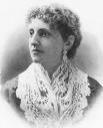Lillie Devereux Blake 1833 - 1913
December 04, 2007
 Lillie Devereux
Blake 1833 -
1913 Fighting to force
Columbia
College to admit female students (a campaign
that ultimately led to the founding of Barnard
College),
Blake asked for help from
Sorosis,
whose Founders Ellen Curtis Demorest
(1825-1898), June
Cunningham Croly
(1829-1901),
and Vice Chancellor Phoebe
Hanaford were ardent
homeopathic supporters. Demorest
was also treasurer at the New York Medical
College, a school dedicated to
training women in homeopathic medicine. Blake was the main
contributor
to Elizabeth Cady
Stanton’s
The Woman’s
Bible,
along
with
Phoebe Hanaford.
Lillie Devereux
Blake 1833 -
1913 Fighting to force
Columbia
College to admit female students (a campaign
that ultimately led to the founding of Barnard
College),
Blake asked for help from
Sorosis,
whose Founders Ellen Curtis Demorest
(1825-1898), June
Cunningham Croly
(1829-1901),
and Vice Chancellor Phoebe
Hanaford were ardent
homeopathic supporters. Demorest
was also treasurer at the New York Medical
College, a school dedicated to
training women in homeopathic medicine. Blake was the main
contributor
to Elizabeth Cady
Stanton’s
The Woman’s
Bible,
along
with
Phoebe Hanaford.
Lillie Devereux Blake writer, lecturer, reformer, and one of the pioneers in the cause of woman suffrage, was born in Raleigh, N.C. The family moved to New Haven, Conn., when Lillie was two years old, and she attended Miss Apthorp’s School for Girls and later was tutored in college subjects by Yale professors. She married Frank Geoffrey Quay Umsted, a lawyer of Philadelphia, in 1855.
A few years later, she published her first novel, Southwold. Her husband died in 1859, and she took up her literary work as a means of supporting herself and two children. During the first year of the Civil War, she was Washington correspondent of the New York Evening Post.
In 1866, she married Grenfill Blake, a New York merchant. Her first active work in behalf of woman suffrage began in 1870. She arranged conventions, addressed committees of both houses of Congress and the legislature of several states, presided at public meetings, and made extensive lecture tours.
One of her novels, Fettered For Life, was written during this period (1874) as a protest against the status of women in the community.
She was president of the New York State Woman’s Suffrage Association for 11 years, and in 1900 she founded the National Legislative League to obtain for women equality of legal, municipal, and industrial rights through action by Congress and state legislatures.
She championed measures which established matrons in police stations, women census takers, and women physicians in insane asylums admitting women patients. (In 1888, led by Lillie Devereux Blake, New York suffragists win passage of a law requiring women doctors for women patients in mental institutions. In 1892 they secure matrons in all police stations).
In addition to her literary career, Lillie Devereux Blake pursued a second career as a women’s rights advocate. In 1869 she joined Elizabeth Cady Stanton and Susan B. Anthony in the fight for woman suffrage. Widely known for her personal charm and beauty, Blake also proved to be a powerful orator, a talent that she parlayed into the presidency of the New York State Woman Suffrage Association (1879-90) and the New York City Woman Suffrage League (1886-1900).
Blake always insisted, however, that the vote was only one of the goals women should pursue in their search for complete social, political, and economic equality. Access to higher education, in particular, attracted her support.
After 1869 she devoted herself to the woman’s movement, touring the US speaking on women’s rights. Some of her accomplishments as a woman’s rights activist include: president of NY State Woman suffrage Association (1879-1890) and Civic and Political Equality Union of New York City (1898-1900) and founder of the National Legislative League.
Successfully leading campaigns to establish pensions for Civil War nurses, to open civil service positions to women, to give women joint custody of their children, to enable women to serve on school boards, and to work in public institutions where women were incarcerated. Blake along with Matilda Joslyn Gage and others signed the 1876 Centennial Women’s Rights Declaration. continue reading:
Blake wrote prodigiously:
Her works include a collection of short stories, a collection of essays, hundreds of uncollected short stories and essays, and 5 novels including _Southwold_ (c. 1859), Rockford; or, Sunshine and Storm (1863), Forced Vows; or, A Revengeful Woman’s Fate (1870), and Fettered for Life; or, Her Lord and Master (1874) and Woman and Paganism in Christianity.
Blake’s public lectures in response to Dr. Morgan Dix’s Lenten lectures on “Woman” were published under the title Woman’s Place To-Day and did much to awaken women to the cause of suffrage. Possibly best known today as the author of Fettered for Life, a novel about the very real potential for women to make not just disastrous, but deadly, marriages. Her last book, A Dangerous Experiment, was published in 1892.
Blake also wrote John Owen’s appeal
Her daughter, Katherine Devereux Blake, co authored Blake’s biography, Champion of Women: The Life of Lillie Devereux Blake with Margaret Louise Wallace:
Lillie Devereux Blake’s daughter, Katherine Devereux Blake (1858-1950) was a pacifist, suffragist, ERA activist, teacher, and a leader in National Education Association. She was an advocate for progressive women’s education. She was also the New York Chair of the Women’s International League for Peace and Freedom. She graduated from what later became Hunter College in 1876 and thereafter began her career as a New York City public school teacher. In 1894 she was appointed principal of the “Girls Department” of Public School 6 (renamed the Lillie Devereux Blake School in 1916). continue reading: